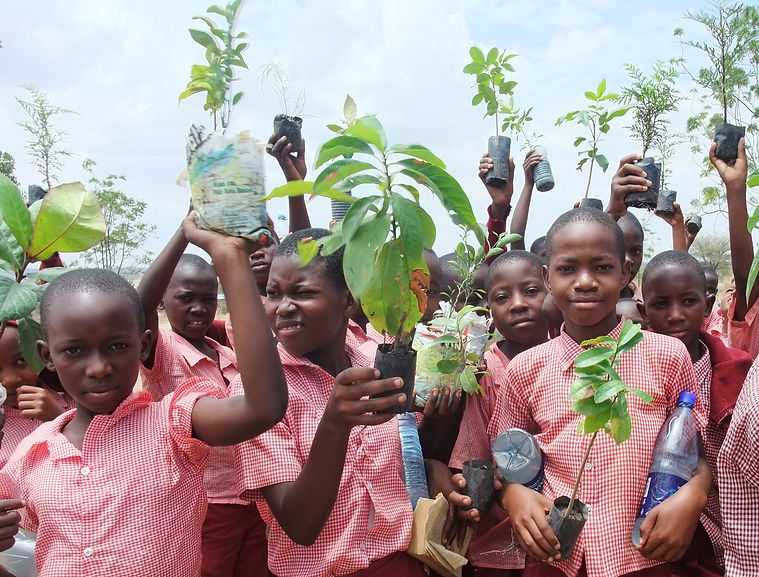Seven Key Areas
2. Education and young people
All faith groups set great store by their beliefs about young people. Faith groups often have a major influence on children's education, both through the beliefs which are passed on, and the schools which in many cases they own and run. Around 50% of educational institutions around the world are founded, managed, or associated with faith institutions, and this figure is even higher in much of the Global South. It follows that through their influence over young people's lives, faith groups have a major opportunity to inspire them to take seriously their responsibilities to the environment.
Live as if you were to die tomorrow.
Learn as if you were to live forever.
Mahatma Gandhi

SCHOOL CURRICULA
First steps: Examine your teaching practice.
-
Does faith-consistent teaching already exist within your formal education system? If so, have you mapped this so you have an understanding of what is taught and what is missing?
-
Once you understand the content of your school curricula, how might you incorporate more in-depth, faith-consistent teachings about ecology and the environment into the curriculum?
-
What capacity and resources do you have for practical teaching and learning, perhaps outside?
-
Have you considered how gender plays a role within your education systems and how this may impact the learning of your young people?

INFORMAL EDUCATION
Next steps: Encourage your community to make changes based on what you have learned.
-
Can your faith-run schools extend the reach of their environmental curriculum by connecting with their local community?
-
If you run faith-based groups for young people outside formal education, how can teaching and activities be tailored to include the environment?
-
If you do not run a school, is there an opportunity to link with a school that already has an environmental programme that could help you set up your own programme?
-
Is there potential to set up environmental youth groups in your local or wider community? Have you considered practical learning opportunities?
-
Are there any opportunities for intergenerational learning to encourage a greater sharing of knowledge, needs and experiences?

Teaching children: Indonesian faith-based environmental group Pepulih: see case study below
SCHOOL BUILDINGS
and GROUNDS
-
Can you ensure all new education buildings and extensions are built with rigorous environmental and sustainability criteria and measurables (eg renewable energy sources, etc.)?
If there are any playing fields and gardens do they pay attention to the needs of wildlife and nature as well as children? -
Do you encourage young people to use environmentally friendly ways of travelling to and from school, such as walking or riding a bicycle?
-
Is there potential to create outdoor classrooms or learning spaces within your school grounds, such as forests or local parks?
-
Do your school policies and the use of school property align with the UN's Sustainable Development Goals?

Biogas digester installed in a Kenyan school to provide eco-friendly energy
SOURCING, CONSERVATION
and RECYCLING
-
Educational establishments are large consumers in the same way as hospitality and catering outlets – are you able to carry through the same environmental principles and apply them to this sector?
-
Do you have policies of water and energy conservation for your educational buildings, and how do you ensure policy is adhered to?
-
What do you do about paper, food, sewerage and other waste? Do you manage your waste in an environmentally friendly way?
-
If the waste you produce cannot be dealt with internally, have you assessed the ethics and values of the external systems you use?

YOUTH ORGANISATIONS
and CAMPS
-
Do you have faith-associated youth organisations where environmental ideas could also be integrated – for example, through running youth camps in nature, organising street cleaning projects, and forest schools?
-
Can you identify any opportunities to link your organisations to wider platforms and networks to ensure that they are being heard?
-
How big is your ambition? What would it look like to create a global faiths youth network?

SCHOOL
ECO-TWINNING
-
Could your youth groups think about eco-twinning with environmental projects where the effects of climate change and biodiversity loss are being felt first-hand? This could be with projects of your own faith in another country, or in other regions of your own country. It could also be a development of an existing twinning relationship to include an environmental project.
-
Do you have knowledge or practical resources that you could share with others through an eco-twinning scheme? What could your faith group learn from your eco-twin partner?

Spreading the word among schools and communities in Indonesia
Pepulih
Pepulih is an Indonesian faith-based environental association, founded in 2004 on April 22, coinciding with Earth Day, and based in the capital, Jakarta. It started as a Christian association but in recent years has expanded its outreach to include other faiths, and now has members of different faith communities on its board.
Pepulih offers environmental education to faith groups in Indonesia, working with communities to raise environmental awareness, and support the following programmes: Green Culture for Green Water, Green Energy, Green Waste, Green Planting, Green Building, Green Village and Green Schools.
Central to Pepulih’s work is the importance of water, sanitation and hygiene – or WASH – programmes. It organises School for Water Days where childcare professionals and teachers learn to make water and hygiene issues integral to their thinking. Among those taking taken up WASH programmes are Sunday schools and schools in the slum areas of Jakarta.
CASE STUDY

Pepulih trains teachers and childcare professionals to pass on health and environmental messages – including the importance of WASH: Water, sanitation and hygiene



